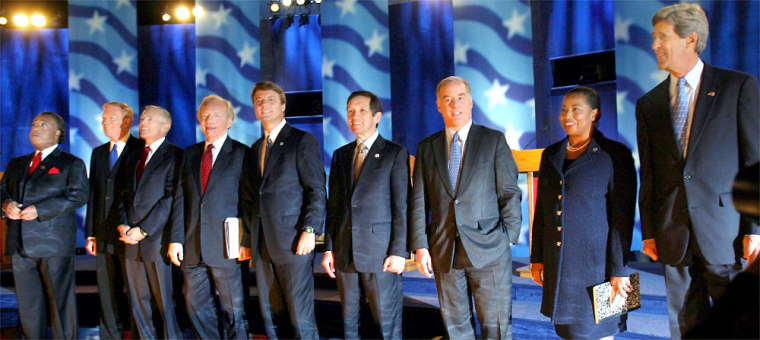With the stroke of a pen, a President Lieberman would end restrictions on stem cell research on his first day of work. President Dean would dash overseas on Air Force One. President Edwards would tend to Washington housecleaning before anything else.
The nine Democrats vying for their party’s presidential nomination are brimming with ideas about all they want to do if they become the nominee and go on to beat President Bush. But the first thing they would have to decide is what comes first.
No one is waiting for Inauguration Day, more than a year away, to make that choice. All have come up with something to do on Day 1 besides thank their lucky stars.
President Kerry would put his health care plan first. President Clark would get to work on his “Turnaround Plan for America” and offer people “accountability benchmarks” to help them figure out whether he is keeping his promises.
Sharpton, Kucinich would bring troops home
President Gephardt would take aim at the big Bush-era tax cuts. Both an Al Sharpton and a Dennis Kucinich administration would summon the troops home from Iraq as the first order of business.
Carol Moseley Braun? “I would pray for guidance and then I would begin to reform health care.”
On many of the big issues — health, jobs, energy and education among them — the Democrats are divided more by nuance than substance.
But when The Associated Press asked them what they want to do first in the Oval Office, the responses were strikingly varied.
Not all named the most important parts of their platform.
Connecticut Sen. Joe Lieberman, in saying he would sign an executive order freeing up stem cell research, chose something that presidents can achieve on their own, without congressional approval.
In similar fashion, Bush signed an executive order on his first day of work in 2001 that prohibited federal financing of groups that offer abortion counseling overseas. His first action on legislation, as promised, was to submit his education overhaul to Congress.
North Carolina Sen. John Edwards says he wants to tackle the way Washington works before moving on to his big-ticket items.
He said he would sign an executive order and seek legislation to limit the influence of lobbyists in Washington.
This would include further restrictions on the ability of lobbyists to hop between jobs in government and interest groups. And he’d stop the “war profiteering in Iraq,” a reference to politically connected companies getting lucrative contracts to rebuild that country.
Missouri Rep. Dick Gephardt, like others, has ambitious and costly plans to expand health coverage and achieve energy independence.
Gephardt: Goodbye, tax cuts
But only Gephardt wants his first day of work to be about erasing Bush’s heavy imprint from the tax code. He can’t wait. “As president, the first thing I will do is repeal the failed Bush tax cuts,” he said.
Howard Dean, too, wants to get rid of all the Bush tax cuts and start fresh with narrower tax reductions for people of lower or moderate income. But alone among the candidates, he wants to get out of the country just after being sworn in to lead it.
His plan: “To make an international visit to our allies to shore up our badly damaged relationships.”
Wesley Clark would come to work with a broad brush, seeking “immediate implementation” of the most far-reaching parts of his platform. He says his “turnaround plan” would reverse course from the Bush years on the economy, education, health care and the environment.
Massachusetts Sen. John Kerry wants to hit the ground running on health care. “I will send to Congress a health care plan that stops spiraling costs, covers every child in America, and makes it possible for every American to get the same health care as any member of Congress.”
Big dreams, all, but new presidents can only do so much to write the script of their first days.
International events may intrude, unexpected controversies may erupt and all that sounds simple in the slogan-packed days of a campaign can become massively complex when the time comes to put ideas into action.
Clinton's false start
That — and more — happened when Bill Clinton came to town in January 1993, intending to hand an economic stimulus package to Congress right away.
As it turned out, that package was not ready as soon as Clinton had hoped it would be, and he instantly faced renewed hostilities with Iraq as well as distractions of his own making — a stormy debate over his pledge to end the ban on gays in the military and damage control over his first choice for attorney general.
Two days into his new job, Clinton’s spokesman acknowledged “mistakes were made.” Clinton delivered on the economic package, but it was far from his first thing.
